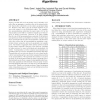Free Online Productivity Tools
i2Speak
i2Symbol
i2OCR
iTex2Img
iWeb2Print
iWeb2Shot
i2Type
iPdf2Split
iPdf2Merge
i2Bopomofo
i2Arabic
i2Style
i2Image
i2PDF
iLatex2Rtf
Sci2ools
116
click to vote
EDBT
2009
ACM
2009
ACM
On the comparison of microdata disclosure control algorithms
Privacy models such as k-anonymity and -diversity typically offer an aggregate or scalar notion of the privacy property that holds collectively on the entire anonymized data set. However, they fail to give an accurate measure of privacy with respect to the individual tuples. For example, two anonymizations achieving the same value of k in the k-anonymity model will be considered equally good with respect to privacy protection. However, it is quite possible that for one of the anonymizations a majority of the individual tuples have lesser probabilities of privacy breaches than their counterparts in the other anonymization. We therefore reject the notion that all anonymizations satisfying a particular privacy property, such as k-anonymity, are equally good. The scalar or aggregate value used in privacy models is often biased towards a fraction of the data set, resulting in higher privacy for some individuals and minimalistic for others. Consequently, to better compare anonymization alg...
Data Set | Database | EDBT 2009 | Privacy | Privacy Property |
Related Content
| Added | 19 May 2010 |
| Updated | 19 May 2010 |
| Type | Conference |
| Year | 2009 |
| Where | EDBT |
| Authors | Rinku Dewri, Indrajit Ray, Indrakshi Ray, Darrell Whitley |
Comments (0)

